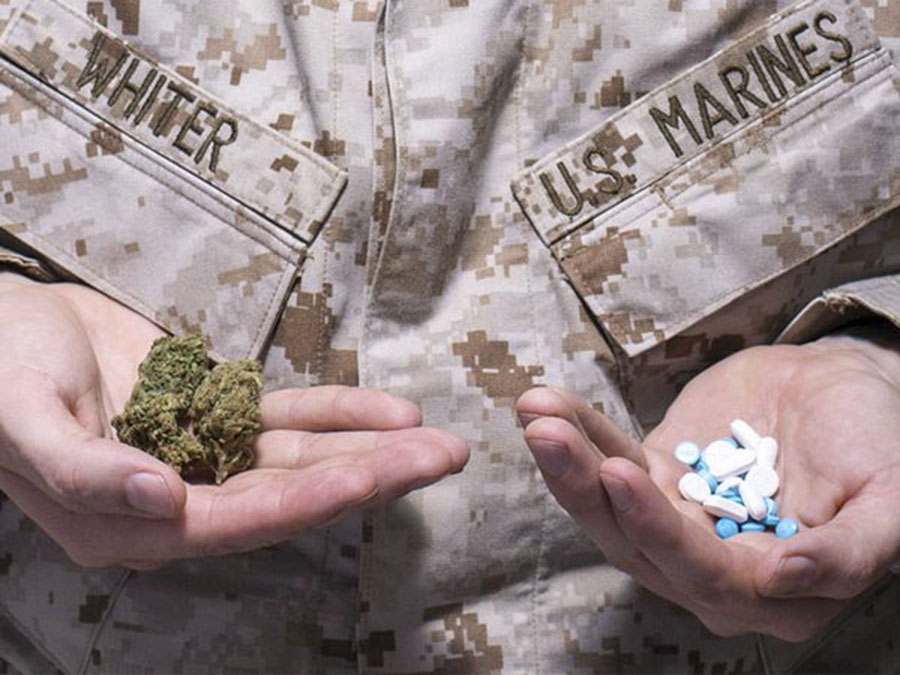Veterans turned out to be crucial for those who want to approve legal marijuana treatments for people suffering from PTSD.
Democratic Gov. Andrew Cuomo announced at the November Veterans Day Parade that he was going to sign a legislation seeking to convert New York into the latest state that allows post-traumatic-stress-disorder patients buy medical weed – although federal law bans it and there’s not much research on the matter.
Right now, there’s a list of 28 states plus the District of Columbia in which people are allowed to buy medical marijuana for their PTSD. According to the pro-legalization Marijuana Policy Project, that list increased rapidly over the past two years, almost doubling its number.
Alaska, on the other hand, could be considered as the 29th state. However, its legislation doesn’t let people buy marijuana to treat their PTSD specifically. In fact, everyone who’s over 20 years old can legally obtain pot, even for recreational use.


The influential 2.2 million-member American Legion, since last year, has asked the federal government to allow Department of Veterans Affairs doctors prescribe medical marijuana in those states where it’s legal. The Legion wants to ease federal constraints and enlarge research. Thus, to know more about how influential could marijuana be for people with PTSD.
“People ask, ‘Aren’t you the law-and-order group?’ Why, yes, we are,” said the Legion’s Executive Director Verna Jones said at a news conference early this month at the U.S. Capitol. But “when veterans come to us and say a particular treatment is working for them, we owe it to them to listen and to do scientific research required.”
The first state who legalized weed for medical usage was California, in 1996, but for a wide range of conditions. New Mexico, in 2009, was the first state to add PTSD in its medical marijuana programs. However, other states started imitating this one in the middle 2014.
Comparing to the early 1990s, there’s now a lot of research on medical and recreational marijuana. However, we still need more of it to fully understand the drug’s negative and positive effects.
Marijuana medical treatments for veterans are now on federal trial in Phoenix. However, we might not see further results for two years.
The Food and Drug Administration warned some companies not to declare that their marijuana-based products were able to cure cancer because there’s nothing to prove they can. The health agency said that announcing this kind of hard statements could harm the legal cannabis market.
Veterans consuming marijuana
Among all the opinions over marijuana, Mark DiPasquale, Retired Marine staff sergeant, considers that the drug freed himself from multiple medications previously prescribed to treat his migraines, PTSD and other injuries that he acquired while serving in Iraq 2005.
According to DiPasquale, who used to land a helicopter, he felt like “a zombie” who wanted to “hurt somebody” before having changed his medication for the drug he calls by its scientific name: cannabis.
The sergeant, who’s also a co-founder of the Rochester, New York-based Veterans Cannabis Collective Foundation, worked hard throughout these past two years to include PTSD to New York’s medical marijuana program. He said that the drug eases his anxiety, sleeplessness and other PTSD symptoms. In addition, he assured that it helps him to focus on getting better each day.
“Do I still have PTSD? Absolutely,” says DiPasquale, 42. But “I’m back to my old self. I love people again.”
Dr. David Shulkin, the Secretary of Veterans Affairs, recently said that there might already be evidence to prove that medical marijuana is “beginning to be helpful.” He also said that his agency is banned to help patients obtain illegal pot.
The disabled Air Force veteran and Veterans for Medical Cannabis Access member – a group that although is based in Elliston, Virginia, has helped several states – said that allowing PTSD patients to treat their condition with marijuana would be “quite a change.”
There’s not complete comprehension on marijuana
There’s still a lot of research to be made to fully understand not only recreational and medical weed but also to comprehend marijuana treatments for PTSD patients.
Weed isn’t just consumed orally. It’s also commercialized in sprays, food and pills.
“The sooner we allow them to live and experience the kind of emotions we do, in an abstinence-based paradigm, the sooner that they are returning home,” said the Republican, former Navy intelligence officer and current reservist who served in Afghanistan, Sen. Thomas Croci.
The New York Senate veterans’ chairman voted against letting people treat their PTSD with weed. According to him, the drug could mask the condition’s symptoms.
Some experts announced early this month that an 11-month-old baby’s death might have been caused by marijuana. But they later said that their words were misinterpreted and that they need to do more research.
No death has ever been linked to marijuana, according to the Drug Enforcement Administration records.
Source: The Washington Post
